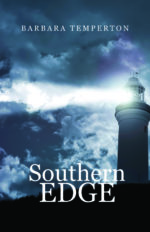Interview with a poet: Poet Barbara Temperton
Q&A with Barbara Temperton, poet and author of Southern Edge
When did you start writing?
Around the age of six, when I finally got hand, pen and paper coordinated: I stole loose-leaf paper from the public toilets at the Port Hedland swimming pool, needle and thread from my mother’s sewing box, and took refuge in the cubby house in our back yard to make my “books”.
I continued to write over the years, encouraged by my teachers, but really didn’t really start writing seriously until 1983 – I returned to study that year and was no longer able to silence the words that wanted out.
What was your first big break?
Fremantle (Arts Centre) Press, especially Wendy Jenkins, and other writers such as Julie Lewis, had been encouraging me since around
1985-7. I’d achieved some small publications and competition wins and was aiming for a book. I’d send in manuscripts and the Press would reject them, but would always invite me in for a session with Wendy who was generous with her advice. Several short listings in the T.A.G. Hungerford Award and publication in significant anthologies really helped my confidence. But I didn’t know I was a poet. All my early publications were in the area of short fiction, so a novel seemed the next logical step. In fact, early on in the piece, an editor once quietly suggested to me that poetry wasn’t my forte. But I worked hard at improving. Enrolling in classes at Murdoch University with Marion Campbell, Lesley Stern and Anna Gibbs and at Curtin University with Thomas Shapcott, Philip Salom, Anne Brewster and Elizabeth Jolley helped in a very big way.
Being accepted for publication in Shorelines (Fremantle Press) with Roland Leach and Michael Heald was my beginning in poetry, but it was actually selection for a residential mentorship with Dorothy Porter at the Varuna Writers Centre in Katoomba NSW in 2000 that turned my writing life around. Going Feral, the draft manuscript I took to that mentorship, was published by Fremantle Press and won the 2002 WA Premier’s Book Award for Poetry.
How do you write your poetry?
I’m a journal writer: I record things, collect things, read, look for oddness, the macabre. I love old newspapers, landscape, legends, local history, and story. I listen for the voice of a poem and I write it down. Over the years I’ve developed a number of techniques that I use to get a poem going, I find sensory explorations particularly helpful in evoking particular environments. Sometimes I’ve been blessed by a poem waiting to be noticed on my doorstep, but most of the time they are the result of years. I am a slow writer.
Tell us about Southern Edge
Southern Edge is the outcome of a creative project, part of my Masters Degree at The University of Western Australia. For the MA I researched local narratives: historical and present day stories, legends, the folklore of place. I collected and transformed into poetry narratives that draw on the most dramatic landscapes of Western Australia. The outcome is three fictional narrative poems, each having a connection to the folklore of the places which inspired them. Southern Edge is a fusion of history, legend, myth, story, found texts, gossip and imagination.
Do you have any advice for other poets who may be just starting out?
Read widely, the classics and contemporary World and Australian poets, and in the art and craft of writing poetry. Make your journal work for you as a creative space. A writing life is a learning experience, make the most of your opportunities to study with more experienced writers and train yourself to be a good editor. Listen. Write. Persist.



